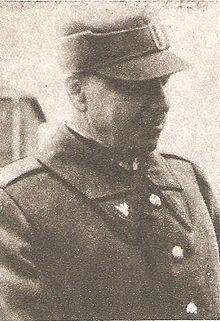Antoni Szylling
| Antoni Szylling | |
|---|---|
 |
|
| Born |
31 August 1884 Płoniawy-Bramura, Łomża Governorate |
| Died | 17 June 1971 (aged 86) Montreal, Quebec, Canada |
| Years of service | 1914 |
| Rank | Generał dywizji |
| Battles/wars | World War I, PBW, Invasion of Poland |
| Awards |
|
Antoni Szylling (31 August 1884 - 17 June 1971) was a Polish general, considered, along with Generals Wiktor Thommée and Stanisław Maczek, to have been one of the most successful Polish Army commanders during the Invasion of Poland of 1939.
Antoni Szyling was born in Płoniawy-Bramura. He finished a 7-year trade school in 1904 and from an early age was an active member of the Polish pro-independence nationalist paramilitary organization the Combat Organization of the Polish Socialist Party. He had several safehouses, in which he stored bibuła and arms, as well as hiding wanted PPS members and members of other organizations. Arrested by the authorities of the Russian Empire, he served several one-and-a-half-month sentences in the Warsaw Citadel and Daniłłiczowski Prison. He was also denied the right to study at a university and was conscripted into the Russian Army for two years (1905–1907). In 1910, he married Zofia Bajkowski (1887–1944). In the years 1909-1912 he was able to finish 'industrial-agricultural courses' at the Higher Agricultural School in Warsaw, and from 1912 to 1913 he worked on an experimental folwark in Szamocin. In 1914 he was mobilized into the Russian Army again and fought in the First World War.
In 1917, with the rank of captain, he joined the Polish 2nd Corps in the East. In 1918 he was promoted to major, and soon afterwards taken prisoner by the Germans. In January 1919 he joined the Polish Army. During the Polish-Soviet War he commanded the 44th Infantry Regiment. In 1922 he was promoted to colonel and later retired at his own request. In 1925 he was commissioned again and became the commander of the 28th Infantry Division in Warsaw. Later he commanded the 23rd Infantry Division in Katowice and the 8th Infantry Division in Modlin. In 1929 he was promoted to the rank of brigadier general (generał brygady). In May 1937 he worked at the General Inspectorate of the Armed Forces in Silesia.
...
Wikipedia
